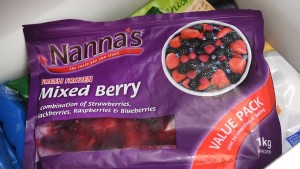Raspberries have lately caused several human norovirus (HuNoV) outbreaks in Europe.
 In this study, we developed and evaluated for HuNoV reverse transcription (RT)-PCR detection in frozen raspberries extraction methods that have equal sensitivity but are less time-consuming than widely used methods based on polyethylene glycol (PEG) precipitation and chloroform–butanol purification.
In this study, we developed and evaluated for HuNoV reverse transcription (RT)-PCR detection in frozen raspberries extraction methods that have equal sensitivity but are less time-consuming than widely used methods based on polyethylene glycol (PEG) precipitation and chloroform–butanol purification.
One method was applied to stored frozen raspberries linked to previous HuNoV outbreaks and berries on sale. In the virus elution-based Method 1, sparkling water eluted viruses most efficiently from the berries. Method 2, based on direct nucleic acid extraction with minor PEG supplement, yielded the highest number of positive findings (4 out of 9) at low virus concentration level of 100 genome copies HuNoV genogroup II per 25 g raspberries. Both methods showed approximately equal sensitivity to a method including PEG precipitation and chloroform–butanol purification. Two naturally contaminated berry samples linked to HuNoV outbreaks in 2006 and 2009 were still positive for HuNoV genogroup I, but all berry products purchased from a local store remained negative for HuNoV. In conclusion, this study presents two efficient and rapid methods which can be used in urgent HuNoV outbreak investigations, since the results of the virus analysis are available in a few hours.


.jpg) and individuals who have been eating frozen raspberries from abroad.
and individuals who have been eating frozen raspberries from abroad. National Food Safety Authority Evira recommends that foreign frozen raspberries always be properly heated before use. Norovirus epidemics have occurred in different parts of Finland over the spring and the cause is suspected to be foreign frozen raspberries used in cakes without heating.
National Food Safety Authority Evira recommends that foreign frozen raspberries always be properly heated before use. Norovirus epidemics have occurred in different parts of Finland over the spring and the cause is suspected to be foreign frozen raspberries used in cakes without heating.